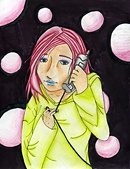All Nonfiction
- Bullying
- Books
- Academic
- Author Interviews
- Celebrity interviews
- College Articles
- College Essays
- Educator of the Year
- Heroes
- Interviews
- Memoir
- Personal Experience
- Sports
- Travel & Culture
All Opinions
- Bullying
- Current Events / Politics
- Discrimination
- Drugs / Alcohol / Smoking
- Entertainment / Celebrities
- Environment
- Love / Relationships
- Movies / Music / TV
- Pop Culture / Trends
- School / College
- Social Issues / Civics
- Spirituality / Religion
- Sports / Hobbies
All Hot Topics
- Bullying
- Community Service
- Environment
- Health
- Letters to the Editor
- Pride & Prejudice
- What Matters
- Back
Summer Guide
- Program Links
- Program Reviews
- Back
College Guide
- College Links
- College Reviews
- College Essays
- College Articles
- Back
Of Mice and Men: A Tale of Shattered Dream
Of Mice and Men is a tragic fiction novel written by John Steinbeck, first published in 1937.
The book narrates the story of two men, George, a small and intelligent man, and Lennie, a burly and clumsy fellow. They arrive at a new farm where they plan to earn money to buy a little piece of their own land. The book has a tragic ending since George ultimately decides to kill Lennie even though he has carried him through many difficult situations. It conveys the theme of the
helplessness of life and the impossibility for the lower class of society to realize their dreams.
Throughout the book, different characters experience moments when their hopes are shattered, which especially underscores the challenges faced by economically disadvantaged people to achieve their goals and mobility.
Due to the innocence of his character, Lennie’s dream is as simple as raising rabbits in a place that he and George are planning to find. However, his dream is shattered when he suffocates Curley’s wife by accident because he does not want her to scream and get people’s attention. After he has committed this crime, he keeps murmuring, “I done another bad thing,” (90) for he feels guilty about breaking his promise to George that he would not get into trouble. Lennie can no longer raise rabbits, which is something he has been longing to do since the story’s beginning, since he knows that once he gets into any trouble, George will have to figure out a solution for him. The fracture of Lennie’s pure but unachievable dream symbolizes a common struggle experienced by people of the lower class.
George possesses a dream of having a piece of his own land and working on his own farm
instead of listening to the orders of somebody else, such as the owner of the farm on which he currently lives. Lennie loves to listen to his description of the picture of them owning a piece of land together and sustaining themselves on their little farm, especially when George depicts that, “We’d jus’ live there. We’d belong there,” (58) This depiction of their farm shows that he has been looking for the sense of belonging for a long time. However, the reality of life does not allow them to do so; as mentioned in the book, all the lower-class people have the same dream of having their own property, but so few of them actually accomplish it. The contrast between George’s perfect imagination and his cruel reality further emphasizes the misery of the lives of the lower class.
Old Candy, a worker at the farm, after listening to the conversation between George and Lennie, also desires to own a share of the farm with them. As he falls into extreme grief when Carlson kills his dog, who has accompanied him for years, he overhears George and Lennie envisioning their land and feels attracted by the idea. The three men appoint each other to a team and promise to realize their dream together by purchasing the land using the money they earn together. Their plan gets so close to reality that “this thing they never really believed in was coming true.” (60) Eventually, however, their dream is disillusioned after they discover that Lennie has murdered Curley’s wife. The collapse of their dream delivers a sense of incapability and defeat as George and Old Candy have done nothing wrong, but the tragedy of unexpected events has shattered their hope.
Overall, Of Mice and Men vividly incarnates the plight of people struggling in the face of
poverty. The hopeful imagination of their dreams contrasts with the cruel reality of life, in which their dreams never come true. I greatly enjoyed reading this book because Steinbeck is also effective at using environmental descriptions to create an atmosphere for the imminent events. Not only in his portrayal of the setting and storyline but also in his characterization of the people, Steinbeck’s novel embodies several degrees of dramatic elements. With its tragic ending, Of Mice and Men delivers the feeling of sorrow through the process of the characters’ dreams breaking apart.

Similar Articles
JOIN THE DISCUSSION
This article has 0 comments.
